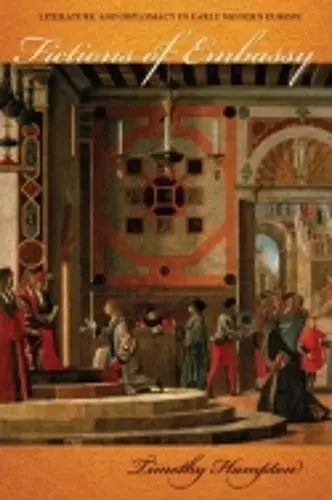Fictions of Embassy
Literature and Diplomacy in Early Modern Europe
Format:Paperback
Publisher:Cornell University Press
Published:15th Feb '13
Currently unavailable, and unfortunately no date known when it will be back
This paperback is available in another edition too:
- Hardback£64.00(9780801447754)

Historians of early modern Europe have long stressed how new practices of diplomacy that emerged during the period transformed European politics. Fictions of Embassy is the first book to examine the cultural implications of the rise of modern diplomacy. Ranging across two and a half centuries and half a dozen languages, Timothy Hampton opens a new perspective on the intersection of literature and politics at the dawn of modernity.
Hampton argues that literary texts-tragedies, epics, essays-use scenes of diplomatic negotiation to explore the relationship between politics and aesthetics, between the world of political rhetoric and the dynamics of literary form. The diplomatic encounter is a scene of cultural exchange and linguistic negotiation. Literary depictions of diplomacy offer occasions for reflection on the definition of genre, on the power of representation, on the limits of rhetoric, on the nature of fiction making itself. Conversely, discussions of diplomacy by jurists, political philosophers, and ambassadors deploy the tools of literary tradition to articulate new theories of political action. Hampton addresses these topics through a discussion of the major diplomatic writers between 1450 and 1700-Machiavelli, Grotius, Gentili, Guicciardini-and through detailed readings of literary works that address the same topics-works by Shakespeare, More, Rabelais, Montaigne, Tasso, Corneille, Racine, and Camoens. He demonstrates that the issues raised by diplomatic theorists helped shape the emergence of new literary forms, and that literature provides a lens through which we can learn to read the languages of diplomacy.
Diplomacy, the most elaborately theorized mode of early modern contact, is the subject of Hampton's book. As Hampton argues, the simultaneous emergence of new literary genres like the sonnet sequence and new diplomatic practices like the exchange of resident ambassadors was no accident. Literary and diplomatic discourses shared a common origin in humanist rhetorical culture.
* Clio *This is a splendid innovative book that significantly complicates and enriches our understanding of a period in which much innovation was indeed taking place in politics, culture, and literature—a book full of exciting twists and turns, original, challenging observations about canonical authors, and impressive depth and breadth.
* Renaissance QuarterISBN: 9780801478413
Dimensions: 229mm x 152mm x 18mm
Weight: 454g
256 pages